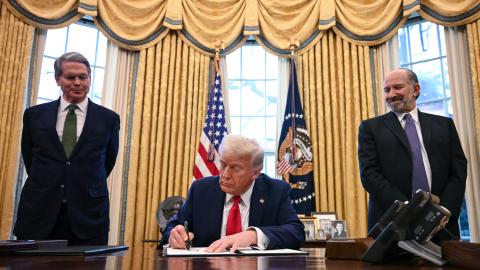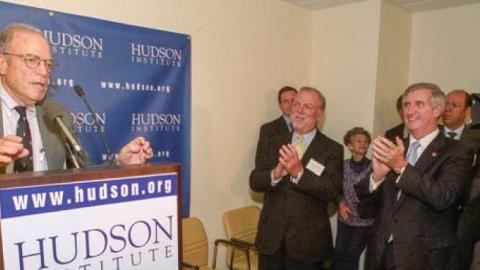Walter Stern was in Egypt about 15 years ago meeting with then President Hosni Mubarak as part of a group affiliated with a Washington think tank. Wearing black sneakers and threadbare clothes, Mr. Stern listened to the polite questions asked by members of the group and then raised his hand.
“Mr. President,” others recalled him saying. “I am Wally Stern and I believe I am the largest private investor in your country. I think you should know what’s wrong with your economy.”
He proceeded to run down a laundry list of concerns with the Egyptian securities markets that made foreign investment difficult. Others at the conference table, Mr. Mubarak included, looked on in shock, said Robert Satloff, executive director of the Washington Institute for Near East Policy, who arranged the trip.
Mr. Stern was an early proponent of investing in international companies during his seven-plus decades as a Wall Street executive, most of which he spent at investment management firm Capital Group. His longtime leadership of the Hudson Institute, a conservative foreign policy think tank, also placed him in the company of world leaders, many of whom sought his advice.
“He looked like the least important person, but when he opened his mouth you knew he was the most important,” said Ken Weinstein, a fellow at the Hudson Institute and its former president and chief executive officer.
Mr. Stern died Feb. 27 in his home in Edgemont, N.Y., according to his daughter, Sarah May Stern. He was 93 years old.
Despite amassing significant wealth, he held on to his self-effacing persona and never developed the swagger typical of his Wall Street colleagues. He avoided the spotlight, and preferred public transportation and flying coach.
His former executive assistant, Sally Goodwin, said Mr. Stern once walked into Capital Group’s Midtown Manhattan office with his pants muddy and dusty, explaining that he had been digging through a trash can on the sidewalk because he noticed some Portuguese painted tiles in it and wanted to take them home.
On a business trip to London, he insisted on staying with his daughter, who was working there at the time and living in a one-bedroom flat with three roommates. Despite the protests of Capital Group’s London office, Mr. Stern slept in a sleeping bag on the floor underneath a table, with his head sticking out one side and his feet sticking out the other.
Walter “Wally” Phillips Stern was born Sept. 26, 1928, in New York. His father was a senior executive at the Wall Street firm Newburger, Loeb & Co. His mother was a homemaker.
Mr. Stern received an undergraduate degree from Williams College in 1950. At the time, Jews—even those like Mr. Stern who weren’t practicing—were few in number at Williams and often pushed to the edge of the social scene, said his daughter, Ms. Stern. He received a masters in business from Harvard University two years later, then did a stint in the Air Force as part of a program meant to place people with business expertise in the military.
He eventually landed in the research department at the investment bank Burnham & Co. Over the next two decades, he became a partner and research director, and developed a particular interest in international investing.
In 1973, Mr. Stern joined Los Angeles-based Capital Group to expand its then-tiny New York office. He was also asked to chair its just-launched New Perspective Fund, which was one of the first funds in the country to have the flexibility to invest in companies outside the U.S. That made it one of the firm’s biggest pushes to invest internationally at the time, and the fund grew quickly.
Mr. Stern was “low-key, but widely recognized and well respected as a leader in the development of securities analysis as a profession,” according to Capital: The Story of Long-Term Investment Excellence, a book about the firm by Charles Ellis. As Mr. Stern later put it, according to a remembrance sent to Capital Group staff this week, the firm “wanted someone who had an international investor reputation and could impress the Merrill Lynch sales folks who were going to place the fund.”
His frugal nature was visible—literally—in the New York office. Mr. Stern refused to replace a ripped carpet in the reception area. Instead, he came to the office one day with a tool belt buckled around his suit, said Ms. Goodwin, his former executive assistant. He pulled out an exacto knife and cut out the ripped square of brown carpet, replacing it with a square of orange carpet he brought from home. The mismatched square remained for visitors to see until Capital moved offices a few years later.
Around the time he started at Capital Group, Mr. Stern’s wife, Betsy, urged him to attend a lecture by the military strategist and futurist Herman Kahn, who had founded the Hudson Institute and was focused on game-planning scenarios in case of nuclear war.
The men hit it off, and Mr. Kahn asked Mr. Stern to join the think tank’s board. The two complemented each other: Mr. Kahn was flamboyant and disorganized while Mr. Stern was soft-spoken and managerial. When Mr. Kahn died in 1983, Mr. Stern, then the board chairman, refashioned the institute to put it on stable financial ground. He remained a benefactor for the rest of his life.
“At that point, the Herman Kahn period ended and the Wally Stern era began,” said Mr. Weinstein, of the Hudson Institute.
When Mr. Weinstein became CEO of the institute in 2005, he and Mr. Stern celebrated by going out to Subway for six-inch sandwiches.
Mr. Stern is survived by his wife of 64 years; three children; eight grandchildren; two great-grandchildren; and his younger brother.

















